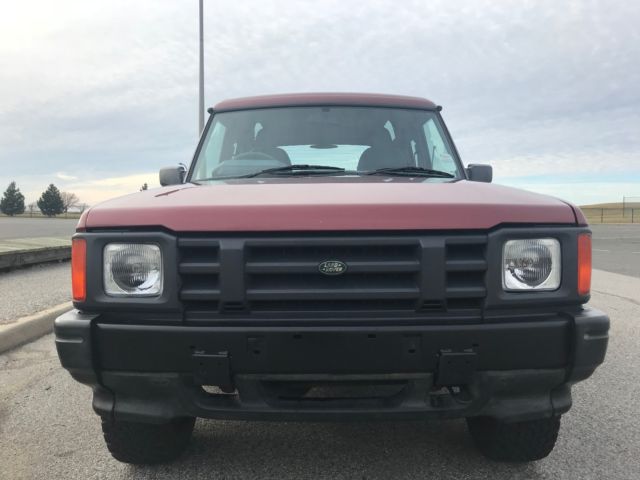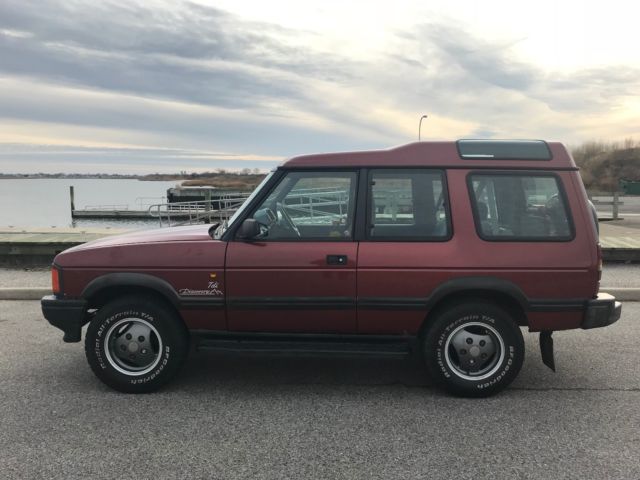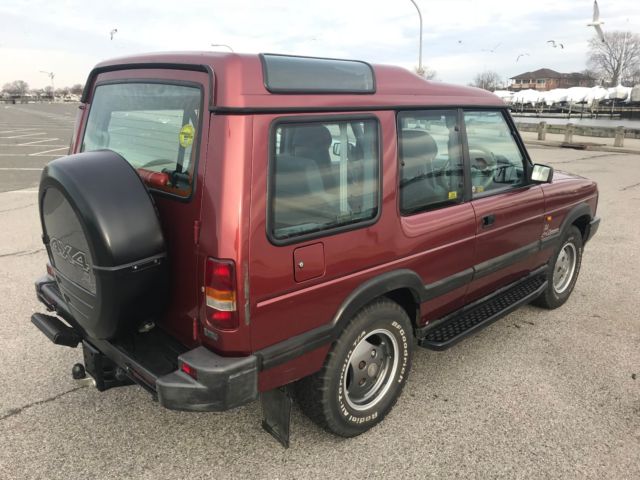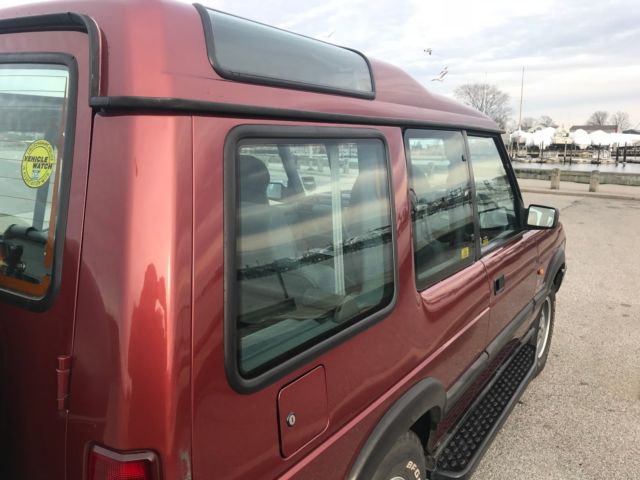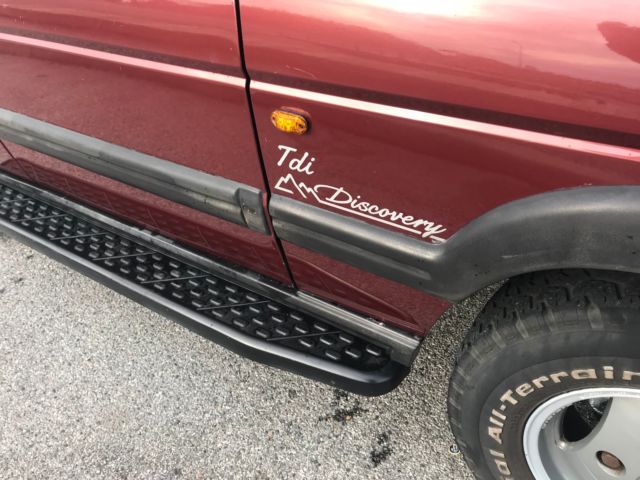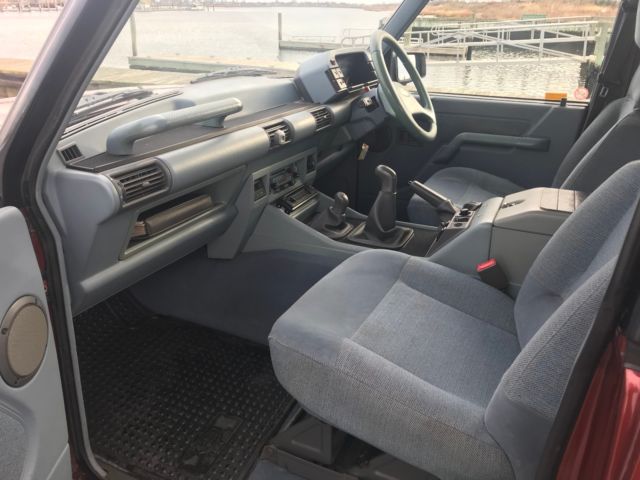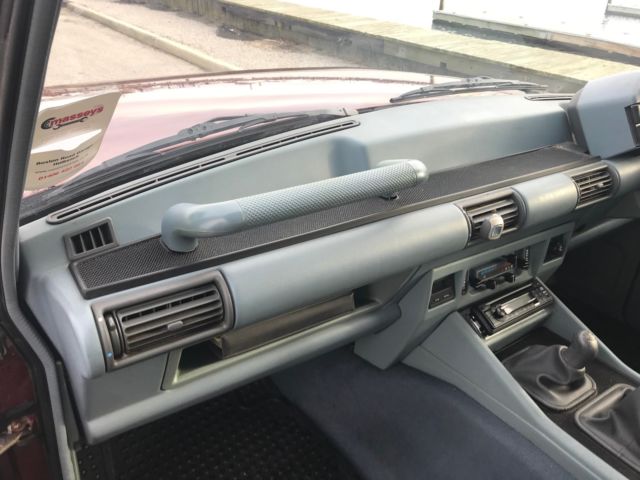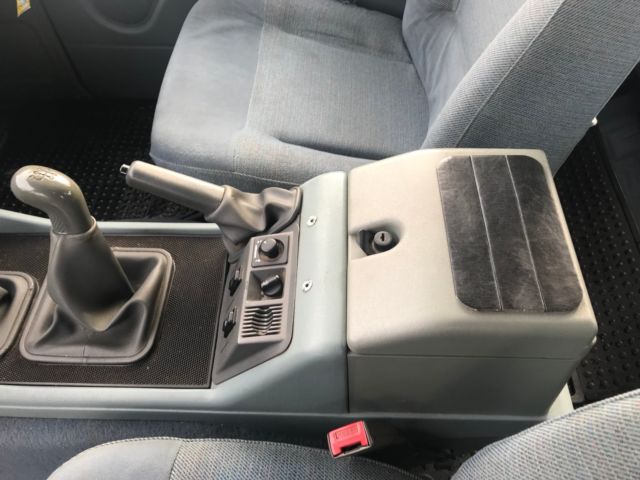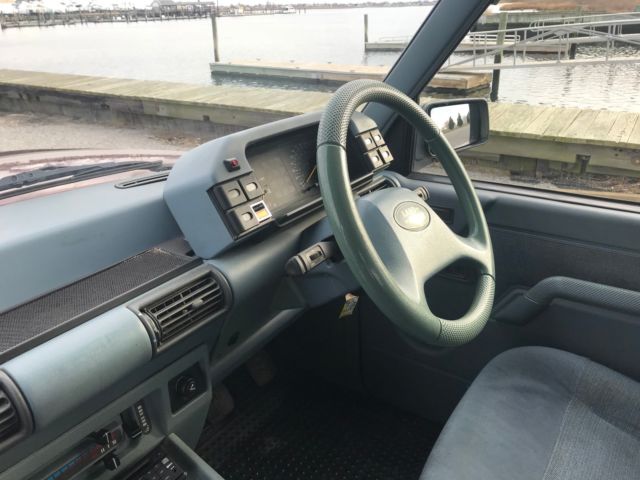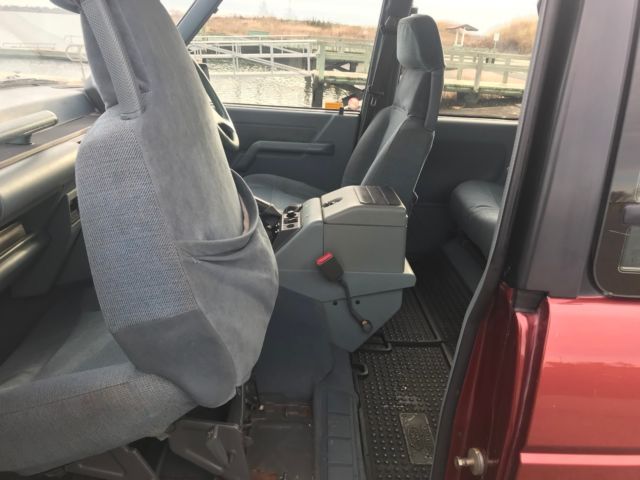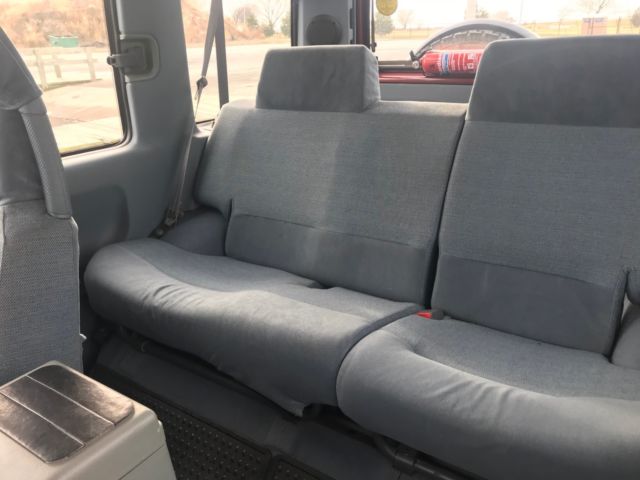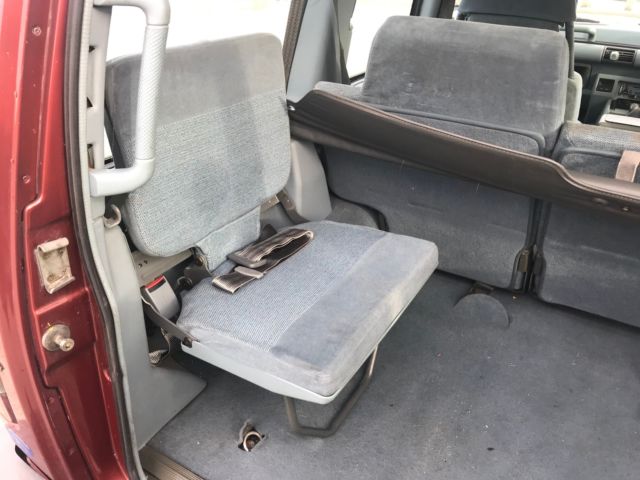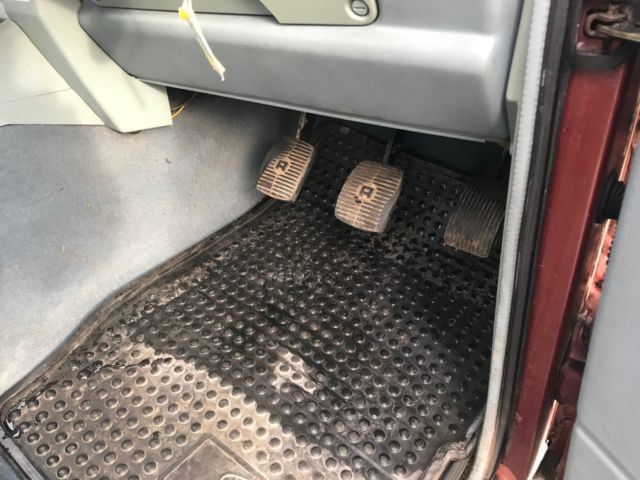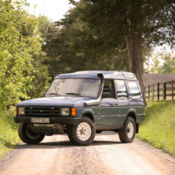1991 Land Rover Discovery 3 Door 200 TDI - Extremely Rare
Technical specifications of Land Rover Discovery 1991
| Price: | - |
|---|---|
| Item location: | Hewlett, New York, United States |
| Make: | Land Rover |
| Model: | Discovery |
| Type: | SUV |
| Trim: | RHD |
| Year: | 1991 |
| Mileage: | 123,000 |
| VIN: | 11111111111111111 |
| Color: | Red |
| Engine size: | 200 TDI |
| Number of cylinders: | 4 |
| Fuel: | Diesel |
| Transmission: | Manual |
| Drive type: | 4WD |
| Interior color: | Blue |
| Drive side: | Right-hand drive |
| Options: | 4-Wheel Drive |
| Vehicle Title: | Clear |
| You are interested? | Contact the seller! |
Description
I'm selling my 1991 Land Rover Discovery 1. The Discovery was launched in Europe in 1990, 4 years ahead of when it first became available here in the US. At the time of launch it was only available in 3-door form and with the Conran Blue interior. These early Discoveries are rare and becoming increasingly sought after. I bought this Discovery 3 years ago and kept it in dry storage, using it occasionally. The vehicle is here in the US, just outside New York.The first years production (1989/1990) of the Discovery have become a collectors car, in particular the factory launch vehicles with the GWAC UK registration plates. At the time Land Rover was launching the Discovery vehicle to fill the gap between the utility 90/110 (now Defender) and the increasingly upmarket Range Rover. This segment was being rapidly filled by competition from the Japanese manufacturers. The Discovery was aimed directly at this Japanese competition with a focus on the younger, family buyers. So as not to compete with the Range Rover it was based on, it was initially only available in 3-door form. To appeal to the younger buyer, Terence Conran was commissioned to design the interior resulting in bold but functional blue plastic and fabric. The Discovery was also the first vehicle to be launched with Land Rovers new at the time, Turbo Diesel engine with direct fuel injection and an intercooler, more commonly known as the 200 TDI. This engine went on to power the whole Land Rover diesel range for the next 5 years and earned a formidable reputation for reliability, good drivability and fuel consumption. The Discovery has the same construction as the Range Rover platform it was based on, namely aluminum outer panels on a steel inner structure on a steel ladder frame chassis. Unfortunately it suffered the same corrosion problems with the steel under body corroding badly. This has resulted in a large percentage of the original Discoveries being scrapped, especially as their engines and drivetrains are valuable for updating older, under powered Series & 90/110 Land Rovers. The engine swap being a relatively simple process.
This vehicle is from the 2nd year of production, I have a copy of the Heritage Certificate that says it was manufactured on the 8th October 1990 and the UK Registration Document that shows it was registered on the 11th January 1991. There were only small changes between the 1st and 2nd year of production, the most notable being the addition of side window demister vents to the end of the facia and the smaller graphics package on the front fender, both of which this vehicle has. It still retains some of the 'quirks' of an early production vehicle including the R & R (Range Rover) embossed on the clutch and brake pedal rubbers and the defunct at that time 'Austin Rover' emblem embossed on the rear tail lights.
It is unlikely that the 3-door Discovery will ever be as valuable as the prices the 2-door Range Rovers are currently commanding, however it is probably safe to say that the 3-Door Discovery is the rarer of the 2 vehicles. This vehicle stands out in not having suffered badly from corrosion and retained been retained in its original condition without modification.
The metallic red paint is original. The label under the hood says it is Red Metallic FoxFire, but the Heritage Certificate calls it Trocadero Red. I'm not sure what happened there, I guess Land Rover decided to change the name of the color at some point. However the paint is all original and in excellent condition. When I bought the vehicle it had a big rubber nudge bar on the front. I removed this as it spoiled the looks of the original front end lamps and grille. I have an original European front license plate plinth to go on it, however it won't fit the front bumper currently fitted which is an aftermarket one with the extra mounting points for the nudge bar. Replacement front bumpers are readily available to return it to its original form. It is fitted with side steps, rubbing strips along the side/wheel arches and a retractable rear step, all of which are proper Land Rover supplied accessories. It is fitted with a very clean set of Range Rover Classic 3-spoke alloy wheel. The exterior plastic trims and seals are all in good condition. Including the seals around the rear side windows. From talking to the GWAC preservation group these seals are impossible to get hold of as they were only used on this vehicle. They also perished with prolonged sun exposure. The fact they are so good on this vehicle indicates it has been garaged for a large part of its life. The fact that these are in perfect condition and also the factory paint is still good makes this vehicle extremely rare and a good starting point for preserving any 3-door Discovery.
The interior is in excellent condition. The Sonar Blue plastic is all well preserved as are the seats. Everything is present and works correctly. It is rare for a Sonar Blue interior to still be intact and in such good condition. The center console has the optional loackable cubby box fitted, which is very practical and a comfortable arm rest, however it does also come with the blue squashy Land Rover bag which was originally supplied with the car and was a feature of these early models. the fabric used on the bag matches the interior of the vehicle. The bag locates in the position currently occupied by the cubby box. The rear load cover is in place and functioning correctly. The rear seats in the load space area are in excellent condition complete with seatbelts. The vehicle has a full set of OEM Land Rover Discovery Rubber floor mats. The vehicle has one glass tilt/removable sunroof (2 was an option) which is in excellent condition and still has the Brittax roller blinds for shielding the sun. The head lining is in excellent condition all around.
The vehicle has covered 122,900 miles. The engine starts instantly and the vehicle drives well. Gear selection is smooth. The vehicle drives straight with no vibrations, rattles or noises. The original viscous cooling fan has been removed and replaced with a Kenlowe electric fan mounted to the back of the radiator. This is a very sensible modification. I MOT'd the vehicle (UK version of state inspection but much more stringent) so that it could be driven to the docks in Southampton. To pass the MOT it required new brake pads all round, a new Front RH caliper and a new master cylinder to bring the braking system back up to performance. I have completed a number of long journeys in it with no problems.
The underside of the vehicle is in remarkable condition. The chassis is solid. I say remarkable from a stand point of all other vehicles of this model rusted away. This is a UK vehicle (not a dry place!) so it has a very good covering of mud and surface corrosion, however there is no perforation corrosion and the body mounts, inner fenders and boot floor are all solid. These are the items that have seen the majority of these vehicles scrapped. It looks like the underside was wax oiled regularly in its early life, however this hasn't been done for a number of years. At this point it really needs a good pressure wash underneath and the underbody and chassis painting and wax oiling to preserve it for many years to come.
Other items to note to turn it into a collectors car. The drivers seat base cushion has started to fray on the outer edge. I have a seat base cushion from another vehicle which is in better condition, it just needs cleaning before being fitted. The instrument cluster surround has been drilled at some point to fit an extra switch/lamp. I have a replacement surround including all the switches, if this is replaced I would also take the opportunity to put the manual switch for the Kenlowe fan in a more discrete place. The fuse box cover (under the steering column) is cracked. I have a replacement that isn't perfect, but at the least the crack in it is smaller. The blue vinyl trim around the rear windows and alpine windows is starting to peel back. This could be re-adhered relatively simply. The rear lights had protective grilles fitted at some point. This has left an unblanked riv-nut next to each light unit and also some very difficult to remove adhesive on one side. The rear bumper is off a later Discovery. This model year only had rear lamps in the pillars, however duplicate lamps were added to the bumper on later model years as it was found the door would block one lamp if opened at night. This vehicle has been updated with the later rear bumper with the extra lamps wired into the existing circuit. Subsequently the indicator repeater detects the extra load from teh additional lamps and thinks a trailer is attached. Subsequently when you indicate the trailer indicator check lamp on the dashboard flashes, it always things you have a trailer attached! Not a big issue.
I haven't got around to titling/registering the vehicle in New York. It has the UK Registration Document (V5) and the appropriate customs (EPA and DOT) stamped paperwork to show it is legally in the US. These documents are what is required to get it titled in your name.
The vehicle is located in Hewlett just outside New York City on Long Island. I'm happy to facilitate viewing and a test drive during the course of the Auction.
